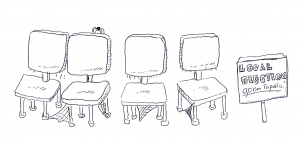Peninsula students are apathetic towards local elections
 According to the College Board, it is unethical “to exaggerate one’s activities and accomplishments or to have someone other than the applicant write their essay.” Yet, with the pressure of acceptance, high school seniors may resort to seemingly unethical measures to impress college admission officers.
According to the College Board, it is unethical “to exaggerate one’s activities and accomplishments or to have someone other than the applicant write their essay.” Yet, with the pressure of acceptance, high school seniors may resort to seemingly unethical measures to impress college admission officers.
“College is very important to students and their families,” senior Rachel Sumi said. “It does not surprise me that some people would fake [applications] to get into a good college.”
Each year, high school students hire college advisers for special assistance with the college application process. Lacy Crawford, a former college application adviser and author of “Early Decision,” wrote in a Wall Street Journal article that college advisers can earn $20 per word writing a student’s essay. She advised high school seniors to “claim that ‘I’.”
Rebecca Dibble, an English teacher, worked as a College Admission Adviser for 12 years, and is aware of advisers writing their students’ essays.
“I definitely heard that in different parts of the country people charge exuberant amounts of money to advise but also ghostwrite for clients, which is highly unethical,” Dibble said. “I am sure it happens around here. I am not aware of anything specific, but you hear things.”
As more students compete with each other to get into colleges, Businessweek confirms that the falsification of applications or trend of hiring someone to write admissions essays is rising.
Crawford also said in her article that well-meaning adults sometimes takeover their children’s essays, causing the essay to lose the writer’s voice. Heather Fishel, a college adviser for Blue Train Tutoring, also have seen parents attempt to hijack a student’s voice.
“Parents are also a very common source of application embellishing – they want their children to succeed and get into as many colleges as possible, but some go to extreme lengths to ensure this,” Fishel said. “I can immediately tell which parts of an essay have been written by a parent.”
The distinction between rewriting an essay and editing can sometimes be an gray area.
“As soon as it becomes that the student has stopped writing and the adviser has taken over then it ceases to be the product of the student and the student is ultimately the one going to college,” Dibble said.
Writing in one’s own voice is important for not only the student but also the college, says director of the College Career Center Terri Lewallen.
“When applying [to] college, you want to present yourself truthfully for who you are,” Lewallen said. “What you say has to be the truth because [colleges] get thousands and thousands of applications. They are trying to create a community so they want all kinds of people on their campus to create it.”
To ensure the validity of applications, the University of California system has a “truth-in” application process that randomly chooses around 1,000 applicants to verify their activity claims.
One “truth-in” female applicant who was asked to confirm her all of her extracurricular activities claimed that she could not show proof of assisting a soccer team, an activity she wrote down in her application, for the head coach had retired. The University of California admissions board responded saying that she could ask parents of the children she coached to write a letter of confirmation to prove her volunteer work. The applicant never responded; consequently, her application was canceled.
“Admissions officers can spot [ghostwritten sentences] – so don’t try to sneak your mom’s sentence about how formative winning the “Most Improved” award was into your essay, no matter how great it sounds,” Fishel said. “The consequences aren’t always obvious – maybe your lies will earn you a rejection letter, or maybe nothing will happen. But it isn’t worth the risk, in my opinion.”

